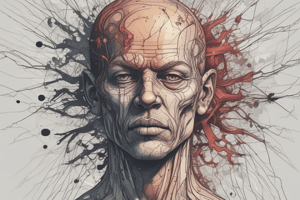Podcast
Questions and Answers
What type of behavior does aggressive behavior convey, according to the material?
What type of behavior does aggressive behavior convey, according to the material?
- I want to hurt you (correct)
- I want to help you
- I want to be friends
- I want to ignore you
Which theory suggests that aggression is elicited by the situation rather than the personality?
Which theory suggests that aggression is elicited by the situation rather than the personality?
- Evolutionary psychology
- Media effects
- Social Interaction Theory (correct)
- Cognitive dissonance theory
What are linked together within neural networks, related to feelings, memories, and action tendencies?
What are linked together within neural networks, related to feelings, memories, and action tendencies?
- Cognitive dissonance and expectancies
- Power and dominance
- Beliefs and attitudes
- Schemas and scripts (correct)
What is the intellectual property of Macquarie University in the provided material?
What is the intellectual property of Macquarie University in the provided material?
Which concept emphasizes learned social behaviors and triggers study purposes?
Which concept emphasizes learned social behaviors and triggers study purposes?
What does the text emphasize as being linked to jealousy and overlapping with evolutionary psychology?
What does the text emphasize as being linked to jealousy and overlapping with evolutionary psychology?
Which knowledge structures are linked to related feelings, memories, and action tendencies?
Which knowledge structures are linked to related feelings, memories, and action tendencies?
Which sub-discipline of psychology is mentioned as providing insights into aggressive behavior?
Which sub-discipline of psychology is mentioned as providing insights into aggressive behavior?
According to Konrad Lorenz's Hydraulic Hypothesis, what is the nature of aggression?
According to Konrad Lorenz's Hydraulic Hypothesis, what is the nature of aggression?
Which type of disorders does clinical psychology identify aggression as a key feature in?
Which type of disorders does clinical psychology identify aggression as a key feature in?
What are the therapeutic interventions for aggression and violence mentioned in the text?
What are the therapeutic interventions for aggression and violence mentioned in the text?
Which theory suggests that memories, emotions, thoughts, and plans for action are linked together in the brain in a specific way, contributing to aggressive behavior?
Which theory suggests that memories, emotions, thoughts, and plans for action are linked together in the brain in a specific way, contributing to aggressive behavior?
Who are some of the experts mentioned in the text as conducting research in the field of aggressive behavior and violence?
Who are some of the experts mentioned in the text as conducting research in the field of aggressive behavior and violence?
According to Bandura's Bobo doll experiments, children were more likely to imitate violent behaviors if demonstrated by:
According to Bandura's Bobo doll experiments, children were more likely to imitate violent behaviors if demonstrated by:
Observational learning of aggression can occur without reinforcement to the observers, according to:
Observational learning of aggression can occur without reinforcement to the observers, according to:
Which neurotransmitter is linked to aggression, with deficits associated with poor impulse control?
Which neurotransmitter is linked to aggression, with deficits associated with poor impulse control?
Biological approaches to aggression involve different brain structures, such as the limbic system, frontal lobes, and specific cortex areas. Which of the following is NOT mentioned as a brain structure involved in biological approaches to aggression?
Biological approaches to aggression involve different brain structures, such as the limbic system, frontal lobes, and specific cortex areas. Which of the following is NOT mentioned as a brain structure involved in biological approaches to aggression?
Increased aggression is associated with lower resting heart rate and under-arousal of which nervous systems?
Increased aggression is associated with lower resting heart rate and under-arousal of which nervous systems?
Personality approaches to aggression include innate aggressive and sexual drives, Big 5 traits, Big 6 (HEXACO) traits, and stable learned material becoming part of personality. Which of the following is NOT mentioned as a part of personality approaches to aggression?
Personality approaches to aggression include innate aggressive and sexual drives, Big 5 traits, Big 6 (HEXACO) traits, and stable learned material becoming part of personality. Which of the following is NOT mentioned as a part of personality approaches to aggression?
According to the text, which theory suggests that when one part of a network is activated, linked parts also become activated, influencing a person’s eventual actions?
According to the text, which theory suggests that when one part of a network is activated, linked parts also become activated, influencing a person’s eventual actions?
Who are some of the researchers mentioned in the text in relation to the development of aggression over the lifespan?
Who are some of the researchers mentioned in the text in relation to the development of aggression over the lifespan?
Which theory suggests that aggressive episodes can run like a movie script, particularly in familiar situations?
Which theory suggests that aggressive episodes can run like a movie script, particularly in familiar situations?
According to the text, which psychological phenomenon is often learned through classical conditioning and instrumental learning?
According to the text, which psychological phenomenon is often learned through classical conditioning and instrumental learning?
Which theory is associated with the idea that frustration leads to aggression, but not all instances of aggression can be traced back to frustration?
Which theory is associated with the idea that frustration leads to aggression, but not all instances of aggression can be traced back to frustration?
Which theory proposes that aggression is 'hard wired' and instinctual, with strong links to animal behavior and survival instincts?
Which theory proposes that aggression is 'hard wired' and instinctual, with strong links to animal behavior and survival instincts?
According to Cognitive Neo-Association Theory, how does activation of one part of the brain influence a person's actions?
According to Cognitive Neo-Association Theory, how does activation of one part of the brain influence a person's actions?
What does Script Theory suggest about aggressive episodes?
What does Script Theory suggest about aggressive episodes?
According to Developmental psychology studies, when does aggression peak?
According to Developmental psychology studies, when does aggression peak?
What does the Frustration-Aggression Hypothesis, based on Freud's ideas, suggest about aggression?
What does the Frustration-Aggression Hypothesis, based on Freud's ideas, suggest about aggression?
What does Evolutionary psychology suggest about aggression?
What does Evolutionary psychology suggest about aggression?
Who made significant contributions to social learning theories according to the text?
Who made significant contributions to social learning theories according to the text?
What does the General Aggression Model (GAM) primarily focus on?
What does the General Aggression Model (GAM) primarily focus on?
Which theory suggests that aggression can be elicited by the situation rather than the personality?
Which theory suggests that aggression can be elicited by the situation rather than the personality?
What are the inputs that can trigger aggression according to the General Aggression Model (GAM)?
What are the inputs that can trigger aggression according to the General Aggression Model (GAM)?
According to the General Aggression Model (GAM), which of the following is considered as a cognitive route to aggression?
According to the General Aggression Model (GAM), which of the following is considered as a cognitive route to aggression?
What does the Social Interaction theory primarily emphasize as the goals that may lead to aggression?
What does the Social Interaction theory primarily emphasize as the goals that may lead to aggression?
What are expressive motor responses?
What are expressive motor responses?
What determines whether a person will engage in a more effortful set of reappraisals?
What determines whether a person will engage in a more effortful set of reappraisals?
What does the process of re-appraisal involve?
What does the process of re-appraisal involve?
What happens when the cycling process ceases during re-appraisal?
What happens when the cycling process ceases during re-appraisal?
What influences the immediate appraisal outcomes?
What influences the immediate appraisal outcomes?
Flashcards are hidden until you start studying
Study Notes
Social Learning Theory and Biological Approaches to Aggression
- Social learning theory by Albert Bandura suggests aggressive tendencies are acquired through direct experience or by observing and copying aggressive role models.
- Bandura's Bobo doll experiments showed children were more likely to imitate violent behaviors if demonstrated by respected or rewarded models.
- Observational learning of aggression can occur without reinforcement to the observers.
- Neural networks and information processing underpin learning theories and are developed through experience.
- Genes, particularly 16 to 17 genes, are linked with aggressive behavior, often in conjunction with specific environments or predispositions.
- Neurotransmitters like serotonin, dopamine, and GABA are linked to aggression, with serotonin deficits associated with poor impulse control.
- Hormones like testosterone, cortisol, oxytocin, estrogen, and progesterone are linked to aggression, with mixed findings.
- Biological approaches to aggression involve different brain structures, such as the limbic system, frontal lobes, and specific cortex areas.
- Increased aggression is associated with lower resting heart rate and under-arousal of the central and autonomic nervous systems.
- Arousal and excitation transfer theory explores the interplay between people's thoughts and physiological arousal in aggression.
- Personality approaches to aggression include innate aggressive and sexual drives, Big 5 traits, Big 6 (HEXACO) traits, and stable learned material becoming part of personality.
- Relationship psychology suggests that learned material can become part of our stable personality.
Understanding Aggression and Psychology
- Macquarie University holds copyright to the material and legal action can be taken for its unauthorized sharing.
- Cognitive Neo-Association Theory explains how activation of one part of the brain leads to the activation of linked parts, influencing a person's actions.
- Unpleasant or threatening situations stimulate negative feelings, leading to fight or flight tendencies, depending on the situation and individual's experiences.
- Anger or fight tendencies dominating a situation can increase the likelihood of an aggressive response.
- Script Theory suggests that aggressive episodes run like a movie script, often leading to automatic responses in familiar situations.
- Developmental psychology studies show that aggression peaks in toddler years and declines with age, being replaced by forms with fewer consequences.
- Some individuals exhibit habitual aggression, which may decline with age but remains higher compared to peers, influenced by various factors including gene-environment interactions.
- Emotion and aggression studies explore the connection between anger, shame, humiliation, jealousy, and aggression.
- Frustration-Aggression Hypothesis, based on Freud's ideas, suggests that all instances of aggression can be traced back to frustration, though this is not always true.
- Evolutionary psychology suggests that aggression is instinctual, with strong links to animal behavior and survival instincts.
- Health psychology, learning theories, and social learning theories explore the links between physical and psychological health and the acquisition and maintenance of aggressive behavior.
- Albert Bandura, a renowned psychologist, made significant contributions to social learning theories.
Studying That Suits You
Use AI to generate personalized quizzes and flashcards to suit your learning preferences.



